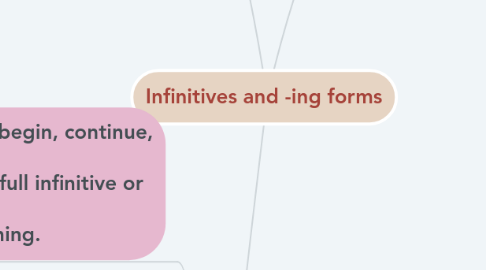
1. Infinitives
1.1. the full infinitive
1.1.1. to express purpose.
1.1.2. after it + be + adjective (it’s nice, it was stupid, etc.)
1.1.3. after the first/second/last/best, etc
1.1.4. after certain adjectives
1.1.5. after too and enough
1.1.6. after certain verbs (need, try, tell, etc)
1.1.7. after the objects of certain verbs ( teach, tell, etc )
1.1.8. after question words (who, how, what, etc.)
1.1.9. after certain nouns (pleasure, shock, chance, etc.)
1.1.10. after some, any, no and their compounds.
1.2. The bare infinitive
1.3. after modal verbs (can, may, must, should, etc.)
1.4. after the verbs let and make in the Active Voice
1.5. after would rather and had better.
2. Verbs followed by full infinitive and -ing form
2.1. Some verbs such as start, begin, continue, intend, etc. can be followed by either the full infinitive or the -ing form with no difference in meaning.
2.2. Some verbs can be followed by either the full infinitive or the -ing form, but with a difference in meaning.
2.2.1. try + -ing form = do something to see what effect it will have
2.2.2. try + full infinitive = make an effort
2.2.3. remember + -ing form = remember something that has already happened
2.2.4. remember + full infinitive = remember something before doing it
2.2.5. forget + -ing form = forget something that has already happened
2.2.6. forget + full infinitive = forget something you are supposed to do
2.2.7. regret + -ing form = regret something that has already happened
2.2.8. regret + full infinitive = be sorry to do something
2.2.9. stop + -ing form = terminate an action and no longer do it after that time
2.2.10. stop + full infinitive = pause temporarily in order to do something else
2.2.11. go on + -ing form= continue an activity without stopping
2.2.12. go on + full infinitive= do something after completing something else
